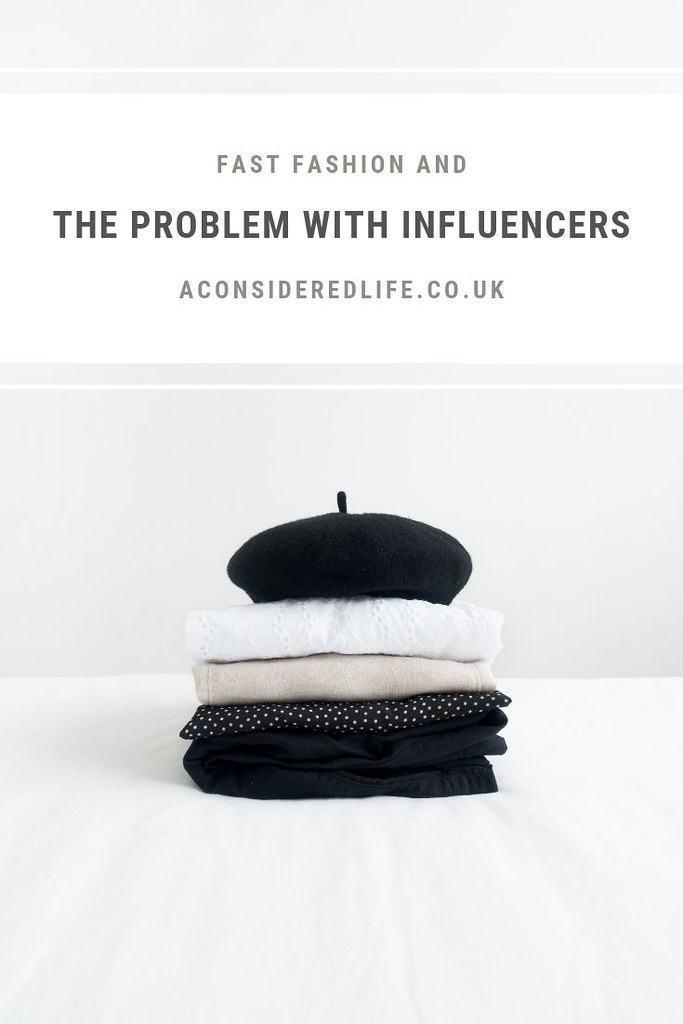
With documentaries like The True Cost and more recently Fashion's Dirty Secret, we've all been made more aware of the shocking environmental impact and human cost caused by cheap clothing. Even fashion influencers cannot avoid the criticism and have started to broach the subject (albeit tentatively) of sustainability.
Environmental issues are at the forefront of everyone's minds as people are paying more attention to the brands they give their money to in a bid to reduce waste and avoid unnecessary purchases. With Instagram engagement at an all time low, it's no surprise that consumers are alert to marketing tactics and are reluctant to engage with influencers promoting products to make a commission.
So it makes sense fast fashion influencers are trying to join the conversation and show their followers that sustainability is something they're also thinking about. We have to be careful of who we listen to when it comes to discussions around sustainability; to find out which brands are actually doing good and which ones are just faking it.
Fast Fashion Influencers and Sustainability
People who rely on selling fast fashion for their income aren’t going to tell you the truth about sustainability or even be all that educated about it. They are not a reliable source of information when it comes to learning about whether a brand uses ethical and sustainable practices. If someone's account is loaded with affiliate links, sponsored posts, and hauls they're unlikely to openly criticise the brands they rely on to pay their bills. They're going to find a way to balance their work of promoting unethical brands with the social awareness of sustainability so they can continue to earn money and save face.
Some of the worst offenders of exploitative labour practices also have the largest marketing budgets. When an influencer has been taken on a PR trip, given a range of products in exchange for promotion, and provided with affiliate links to earn a commission from; these influencers are not going to tell you the truth about that brand and their practices. In fact, the brand is going to greenwash information about their practices for influencers to pass on to their followers. That's exactly what H&M did with its recycling scheme. It would take H&M up to 12 years to use just 1,000 tons of clothing waste. Meanwhile, it produces that same volume of new clothes in a matter of days and encourages yet more spending with the incentive of a £5 gift voucher.
When fast fashion influencers join the conversation about sustainability, all the while continuing to accept money from unsustainable brands and helping them to greenwash their business; it's just a power move to dominate even more space online and retain the privilege they have of earning money from unethical practices while presenting themselves as caring about sustainability.

Fast Fashion As It Stands
Fast fashion brands want you to see them as a sustainable option without having to change the practices that make them unsustainable so they employ fast fashion influencers to push their "eco" collections and recycling schemes to get you to believe these brands are at least doing something (however small) to make changes when the reality is, they haven't changed anything at all.
It's easy for big brands to look good, they can self-regulate. Sustainability standards are voluntary and are an easy way to make brands look like they care when they don't. Shoppers and influencers alike believe them because it's easier to turn a blind eye to unethical practices rather than face facts and change our habits. There are huge question marks over the sincerity of brands who profess to be making changes. The reality is they're doing nothing to reduce the colossal environmental impact caused by their clothing.
Clothing production has more than doubled since 2000. We wear fast fashion clothing less than 5 times and keep for only 35 days. It doesn't matter that H&M (who owns COS, & Other Stories, ARKET, Cheap Monday, Monki, and Weekday) is promising to increase living wages, switch to 100% renewable energy, use 100% recycle or sustainably-sourced materials by 2030, and to become "climate positive" by 2040. Their recycling scheme does very little to put a dent in waste when they're still producing 500 million garments each year.
As my favourite quote by Sophie Benson, writer, stylist and lecturer, goes: "H&M offering one tiny eco collection and calling themselves sustainable is like McDonalds selling a bag of carrots and calling themselves a healthy restaurant." If H&M and other fast fashion brands aren't prepared to severely reduce the amount of clothing they produce, they don't get to call themselves sustainable or frame themselves as environmentally-friendly because they're not.
A small collection of clothing made from recycled or sustainably-sourced fabrics isn't enough to offset the damage of producing hundreds of millions of clothing every year and does not excuse fast fashion brands of their culpability in the exploitation of their workers and the environmental damage caused by their practices.
We'd be able to applaud these efforts of producing eco-friendly options and recycling schemes if they actually worked and were carried out in earnest, but they're not. It's virtue signalling to win over consumers who don't want to change their habits and shop somewhere less convenient. If brands can convince their customers they're making efforts to change, that's enough to keep people buying from them.
If H&M and other fast fashion brands really cared about sustainability, they would make changes to reduce the amount of clothing they produce and work on correcting their unethical practices from human rights violations to environmental damage.

The Mouthpiece For Fast Fashion
That's where influencers step in.
In becoming a mouthpiece for unethical brands, influencers can talk about sustainability all the while accepting money from unsustainable brands; encouraging us to wear and rewear our clothes and yet, each season, yet urging us to buy something new with their affiliate links.
When influencers like Brittany Bathgate, Emma Hill, The Frugality, and those of a similar ilk are one minute talking about sustainability and the next shilling fast fashion clothing, you've got to question their motives and their understanding of what sustainability actually means. It's nothing but virtue signalling to claim to care about sustainability while continuing to work with unethical brands.
These are affluent privileged white women who can afford to buy sustainably-made clothing and are choosing not to; because let's make this clear: it is a choice for them to not spend their money on ethically-made products. If you can afford to shop at ARKET, COS, Topshop, Zara, & Other Stories, you can afford to spring for sustainably-made clothing, much of which is around a similar price point. It's nothing more than a feeble excuse for not changing bad habits.
Influencers will argue the problem isn't who made the clothes but how long you keep them for. We can continue to buy from fast fashion brands so long as we wear those to death; conveniently shifting the blame from the brand to the consumer. "If we we just wore our clothes more we wouldn't have a problem." Well, that simply isn't true.
No matter how long you keep your clothes for, how often you rewear them, or if you only buy a few things each season and recycle them; the brands and the clothes they make are not sustainable, and will never be sustainable, until they change their practices. Yes, we should all be wearing the clothes we already own more often - fast fashion and all. But, more importantly, we should stop buying in excess and stop supporting brands who exploit their workers and the environment.
The real reason these influencers continue to work with brands who exploit their workers and destroy our planet is money. Influencers won't take any responsibility for their role in promoting fast fashion by changing their habits (and their content) because they rely on it for their paycheck. It's easier to continue as they are, promoting fast fashion, and throw in a few words about sustainability to avoid criticism.
Influencers bringing sustainability to their channels and talking about the topic may, hopefully, increase people's awareness. However, this message to "slow down purchases, buy only what we need, and rewear repeatedly" is often sandwiched in between hauls, sponsored ads, and fast fashion promotions. A contradictory message indeed.

The Reality of Fast Fashion
The production of fashion must slow down, now. We don't have much time and there certainly isn't enough of it to tiptoe around the issue of influencers and their role in promoting unethical and unsustainable shopping habits. Change isn't going to happen unless we give up some of the privileges we're used to.
We, as consumers, have to take some responsibility for what we buy and how much of it, and influencers have a responsibility to educate themselves (beyond the realms of press releases) and change their content from shilling unethical brands to promoting more sustainable habits. If that means taking a pay cut so be it because right now how most influencers are making their money is as unethical as it is unsustainable.
Our planet doesn’t have enough time for us to be coddling influencers who are shilling fast fashion clothing and telling us it’s sustainable. Even if they are "making efforts" to bring the conversation of sustainability to their audience; if an influencer continues to partner with unsustainable brands, it's nothing more than virtue signalling.
I don't want to bash anyone for trying to learn about sustainability and share their journey online; we all have to start somewhere. However, you can't do both. You can't claim to care about sustainability while not making any meaningful changes to stop promoting unsustainable brands. When we can and have the knowledge to do so, we have a responsibility to make better choices; to shop less, buy fairly made clothes, and support brands who are doing the right thing.

